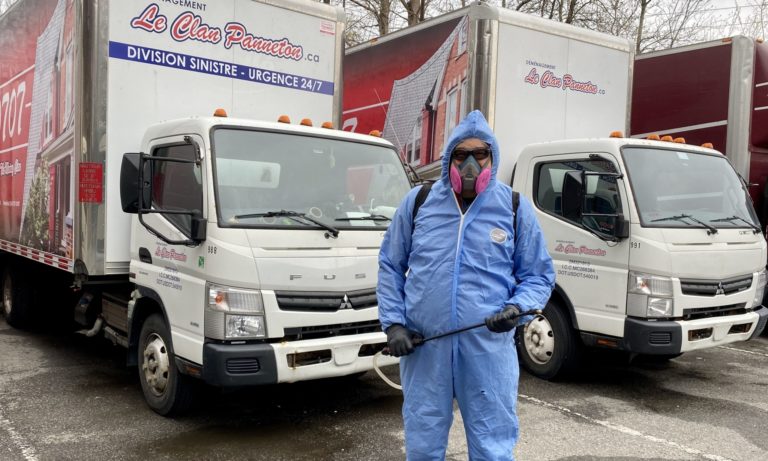Quebec movers face Covid-19 challenges ahead of July 1
MONTREAL, Que. – Between 200,000 and 250,000 Quebec households change their address in a given year, according to Regie du Logement du Quebec, the agency that regulates landlord and tenant agreements in Quebec.
This year, Covid-19 will add to the stresses associated with moving day at the best of times.

“I had a lot of calls from people wondering if they were going to be able to move,” says Frederik Girard, director of the Montreal branch of Demenagement La Capitale, as the province approaches its traditional moving day of July 1.
At the very least, a temporary freeze on construction activities delayed completion dates for many new homes and condos.
Le Clan Panneton owner Pierre-Olivier Cyr says his business recorded 400 fewer moves than usual last month, due to the uncertainty that reigned in the days following a “pause” in Quebec business.

But Cyr and his team have been leveraging social media and television ads to reassure customers about hygiene standards and other precautions being taken during Covid-19. And the message appears to be sticking. “We made up for the delay we had on reservations,” he says.
The new focus is not limited to residential moves alone, however. Girard has seen commercial contracts postponed as well. Many of the clients that planned to move on a specific date in late march of April were forced to close physical locations. There wouldn’t be anyone to welcome the movers.
“I can’t go and move the offices without knowing the accesses, the people there,” says Girard.
But both moving companies say their trucks are ready to roll when customers are ready to move. Supplies of replacement components are at the ready.
“We tell people to buy local, but I also say to buy legal.”
– Pierre-Olivier Cyr, Clan Panneton
Preparing employees can represent one of the bigger challenges, though. Cyr says it can be difficult to source personal protective equipment such as gloves, masks and disinfectant such as Purell or the sprays to disinfect vehicle interiors.
It’s a new cost to consider at the very least.
The bigger challenge, however, can relate to competitors who take jobs under the table. Some of those operations are moving staff onto the emergency Covid-19 relief benefits, and then offering the workers cash on the side, Cyr says.
“We tell people to buy local, but I also say to buy legal. Do business with companies that really pay their employees, who give you invoices, who pay taxes and [source contributions] because these are the companies that give back to society,” says the Clan Panneton owner.
The challenge is expected to rear its head during the peak moving period to come.
“The 1st of July, I need 300 employees. Will I be able?” he asks, referring to part-time workers who will be doing the math. “Why would I take 20 hours a week if I can make $500 to stay at home?”
Customers will present new demands of their own.
“There are a lot of customers who ask a lot more questions, who monitor what is going on more, and that is normal. People are stressed to see people who come to their homes and who they don’t know,” says La Capitale’s Girard.
Retirement residences, meanwhile, may place other restrictions on moving activities.
“We have to make sure that we have the right to do so,” says Cyr.
Then there are the steps to protect movers from exposure to Covid-19, since they will be sharing elevator buttons and stair railings with other residents. Social distancing is not always going to be possible when lifting a fridge or sharing the space in a truck cab.
“I can’t put plexiglass in my trucks to separate the three guys.”
Pierre-Olivier Cyr, Clan Panneton
“I can’t put plexiglass in my trucks to separate the three guys,” says the owner of Clan Panneton.
Rising summer temperatures will add another level of discomfort for those who need to wear an added level of PPE, too.
“When you force yourself, you need to breathe and you want fresh air,” says Cyr. He is reaching out to discuss the additional potential of heat stroke during discussions with CNESST – the provincial agency that oversees workplace heath.
La Capitale is looking to minimize the risks by keeping teams together, and ensuring that protective gloves are always changed before entering a truck. Employees will be screened for signs of the virus before beginning work as well.
But for now, Girard says there is room for optimism.
“As the government announces re-openings, there are calls coming in for things in May,” he says.
At Clan Panneton, Cyr stresses the need to be flexible.
“In a crisis situation, you have to know how to manage in the shortest possible time,” he says. “We don’t plan for the future yet.”
- This article originally appeared in our sister publication, Transport Routier, and has been translated from original comments in French.
Have your say
This is a moderated forum. Comments will no longer be published unless they are accompanied by a first and last name and a verifiable email address. (Today's Trucking will not publish or share the email address.) Profane language and content deemed to be libelous, racist, or threatening in nature will not be published under any circumstances.